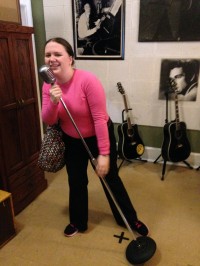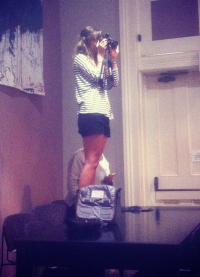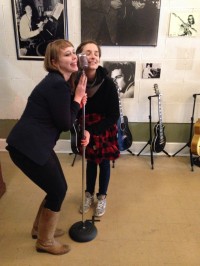Grad Student Guest Post: Recap with the Second Years
Second year grad student Sophie Hay wrote about her classmates last year as they entered the program, and here she updates us on how their research interests have evolved since they arrived in Oxford.
Recap with the Second Years
Last year I introduced my cohort to the Southern Studies community in an article written for the Southern Register. Bright-eyed and bushy-tailed, we had no idea what a tempestuous journey we were in for. Acclimatizing to the sleep deprivation and never-ending workload endemic to graduate school was an experience we won’t easily forget, but, engaging classes, supportive faculty and an ever-compelling South to study made the challenge entirely worthwhile. I caught up with my cohort, now seasoned graduate students, to hear about their individual Southern Studies experiences and to find out how their interests have changed since entering the program last fall.
Amanda Berrios
“Entering the program, I wasn’t sure what my focus would be. In my first semester I really enjoyed my foodways class and reading about Latino immigration to the south in SST 601 so I really believed that I would be writing a thesis in that area. However, over the summer I volunteered at the Billy DeFrank Lesbian and Gay Community Center with the senior program when I wasn’t working. Having enjoyed my time at the Center, along with the Supreme Court ruling over marriage equality and watching as a few states tried to continue denying licenses, I knew that this is where I wanted to focus.” Amanda will take the internship track next semester; she is currently interning at the Memphis Gay and Lesbian Community Center and will complete a research project stemming from her work there. After she graduates, Amanda plans to move to California, get married, and work for a non-profit organization that serves the LGBT community.
Three words to summarise her experience so far? “It’s been fun.”
Words of wisdom for the new first year students? “Have fun!”
Mary Blessey
Mary is still deciding what to focus on next semester but says she is “considering doing a documentary/oral history project on the J-Settes dance team at Jackson State University and the popular dance style of “j-setting” that bears their name” after discovering them on YouTube. Though she can’t specify what she wants to do after graduating she does know for sure that she plans to “bring up “regionalism” as a topic at parties”… Dr McKee will be proud.
Three words to summarise her experience so far? “Barnard chairs squeak”!
Words of wisdom for the new first year students? “You can shape this program into pretty much whatever you want it to be, but you have to take initiative and be creative with your project ideas. Don’t get so busy with homework and papers that you forget the take advantage of perhaps the most valuable resource this program offers, which is the professors. Go knock on their doors and talk to them and try to soak up some of their smartness by osmosis because they’re cool people who know more than you.”
Chris Colbeck
“Before starting the program, I had very strong ideas about my thesis topic and its construction. All of that changed after being exposed to new ways of thinking about “the South,” new approaches, and using the storytelling capability of film to add to the project.” Chris is keeping his plans for next semester top secret(!), but says he has been inspired by the implosion of his previous ideas. After graduating he hopes to keep on studying in some capacity, even if independently.
Three words to summarise his experience so far? “Pleasantly, productively unsettling.”
Words of wisdom for the new first year students? “Read everything with an open mind and try to really consider the arguments presented even if they do not immediately speak to you. You may be surprised by what ultimately informs your own thinking.”
Katie Gill

“I came in thinking that I’d want to work more on the Civil Rights Movement and have a history focus, mostly because that’s what I focused on in undergrad. Now, I’m leaning more towards something interdisciplinary/something more cultural studies and have pretty much abandoned history to the wolves. The current idea is writing a thesis on the role & representation of the South and southerners in Marvel comics. After writing my undergrad thesis on a rape case, I wanted to write about something that I’d have fun reading and researching and wouldn’t make me majorly depressed for my final year. This also got inspired by a long ranting discussion I had with a friend of mine about the X-Men and Avengers movie franchise.” After Katie graduates, she hopes to work at a museum or at a state department of archives.
Favorite class? “I really enjoyed Dr. Gussow’s seminar on blues music, mostly because blues music is something I knew absolutely nothing about before taking the class.”
Words of wisdom for the new first year students? “I know that near the end of the semester, you’ll be tempted to just hunker down in your room and not talk with humanity until the final paper is ended. But if you set yourself a small little goal in between that final stretch of writing a paper (watching an episode of a TV show after writing 5 pages, a 30 minute YouTube break after 2 hours of paper writing) then your mental health will just be SO MUCH BETTER. Schedule in that fun time.”
Bryan Hawks
Bryan’s research has taken a more interdisciplinary bend since he began the program and he has enjoyed approaching unexpected topics with a new degree of introspection. He is still undecided about his route for next semester but says: “My best laid plan [is] probably a documentary attached to a paper on masculinity. I’m still trying to keep it open but I fear I must commit soon. I have a unique opportunity to document fighters and, having grown up a fighter now fat and unable to fight, I can only live vicariously. I’ve never really known what I wanted to be when I grow up and I’ll probably do something to prolong that prospect”.
Three words to summarise his experience so far? “Objectivity, multiplicity, blah-blah-blah.”
Words of wisdom for our new first year students? “Try and not stress to the point that it passes you by. This is a really special program in a unique place and it is all the better for your involvement.”
Sophie Hay
 “I came in to the program primarily interested in the Civil Rights Movement. I’m still concentrating on race but on a much broader scale. Next semester I’ll be interning with L.O.U Reads, an Oxford based coalition seeking to improve early literacy proficiency. Last year I wrote a paper for SST 602 on the school to prison pipeline, which brought my attention to education. Now I’d like to consider how race and education intersect, why racial disparities in early reading proficiency still exist and what organisations like L.O.U Reads are doing to change this.” After she graduates, Sophie will return to the UK to start her career. Though she hasn’t decided what line of work she wants to go into, she is considering the non-profit sector or the Ministry of Justice.
“I came in to the program primarily interested in the Civil Rights Movement. I’m still concentrating on race but on a much broader scale. Next semester I’ll be interning with L.O.U Reads, an Oxford based coalition seeking to improve early literacy proficiency. Last year I wrote a paper for SST 602 on the school to prison pipeline, which brought my attention to education. Now I’d like to consider how race and education intersect, why racial disparities in early reading proficiency still exist and what organisations like L.O.U Reads are doing to change this.” After she graduates, Sophie will return to the UK to start her career. Though she hasn’t decided what line of work she wants to go into, she is considering the non-profit sector or the Ministry of Justice.
Favorite class? “It’s hard to choose but probably Southern Studies 601. This class really upturned my pre-existing ideas about the South by making me question “Southern exceptionalism”.
Words of wisdom for the new first year students? “Try and organize your time so that you’re chipping away at your weekly readings in small chunks each day. Also, try and enjoy yourselves. You know what they say about all work and no play…”
Sarah Holder
“My thesis project remains the same crazy mess: a literary and sociological analysis of The Southern Vampire Mysteries by Charlaine Harris. I want to get at how the series treats genre, race and ethnicity, gender and sexuality, and the South itself. Ultimately, I hope to explain how fantasy estranges a recognizable region into something both alien and accessible, and how the series is a means by which lay readers can learn lessons of diversity and tolerance in a safe space. This has been a project brewing in my mind for years, ever since the book series concluded and I feverishly read the last novel my senior year of college. I knew I had something to say about these books, but it’s only now that I’ve figured out what (maybe?).”
Three words to summarise her experience so far? “Schizophrenic, which I think is worth three words. And I mean the textbook definition of schizophrenia: “emotional blunting, intellectual deterioration, social isolation, disorganized speech and behavior, delusions, and hallucinations.” But I think all those things are a little necessary to the grad school experience. I felt so motivated to work my hardest that I let a lot of my social and emotional health slide, which was a valuable lesson to learn, because when your you-time suffers your work suffers. I didn’t see hallucinations per se, but I did have a lot of school-related nightmares.”
Words of wisdom for the new first year students? “If I could give advice to first years, it would be to not work too hard. Not working hard enough means not making the most of your time here, but working too hard makes you… schizophrenic.”
Amanda Malloy

“My interests have not changed, but I have learned that in research it is important to keep an open mind. A book that you have to read for class, that you may have no initial interest in, can end up being one of your most helpful resources. [Next semester] I’ll be looking at and writing about southern photography. I knew coming in that I wanted to focus on southern art. I just wasn’t sure where I would channel that interest.” Amanda isn’t yet sure what she plans to do immediately after she graduates but knows that she would like to return to graduate school in the future.
Three words to summarise her experience so far? “Words cannot describe.”
Words of wisdom for the new first year students? “Talk to your professors about your ideas. Talk to anybody who will listen about your ideas. Also, give yourself a little time to explore the South you’re spending so much time studying. Put the book down every once in a while and go for a drive.”
Yaeko “Eko” Takada
Eko’s fascination with Southern blues music has “not changed much [since starting the program] but has developed unexpectedly far and deep since coming to Oxford three years ago.” Eko hasn’t come to a firm decision about what her thesis topic will be yet: “I am really unsure because there are so many interesting aspects in my research theme. I might decide on the cast of the pencil anytime soon.” Eko says that after she graduates from the Southern Studies program, she “would like to take up another game!”
Favorite class? “Can’t pick one. All.”
Words of wisdom for the new first year students? “Stick with Dr. McKee. You won’t be lost.”
Irene Van Riper
“I came wanting to write about local food systems. The program has given me the opportunity to delve into the subject and it’s given me the skills to approach it from an interdisciplinary perspective. [Next semester] I’ll be considering the challenges and opportunities in the development of North Mississippi’s local food systems, and I’ll be contextualizing them within local, national, and global discourses about small-scale food production. This was inspired by my work in North Mississippi’s local food systems since 2011, my work with Mississippi Delta non-profit organizations last semester, interviews I conducted over the summer with local farmers, and from my internship with MSAN (Mississippi Sustainable Agriculture Network) over the summer.” After she graduates, Irene would like to continue working in the field of sustainable agriculture/local food systems.
Favorite class? “SST 601 with Dr. McKee because it trained me to think critically about southern culture in local, national, and global contexts.”
Words of wisdom for the new first year students? “Don’t worry, do the reading, talk with your professors, start your research projects early, and don’t worry.”
Brandy Williams
“I’ve switched topics multiple times, but I think I’m solid on my area of interest now. It’s tough because the more research I do, the more ideas I have. I am centering the thesis on texts from Vietnam, Iraq, and Afghanistan. I’m interested in trauma theory and memory in the texts, but I’m also interested in trying to apply the idea of Southern honor and Southern masculinity to the readings. One aspect I’d like to cover is the idea of writing as therapy: vets write and it helps them, the public is able to understand veterans and PTSD better because of the writing, and other veterans are able to read these works and learn how to craft their own story, find their own way to heal. I’m not sure what the final direction will end up being because there are too many moving parts right now…I’m a veteran, and I actually was trying to stay away from anything military related.”
Three words to summarise her experience so far? “Challenging, rewarding, exhausting.”
Words of wisdom for the new first year students? “Manage your time wisely, and stay healthy. Give yourself some “me” time even when you don’t think you have time for it.”
